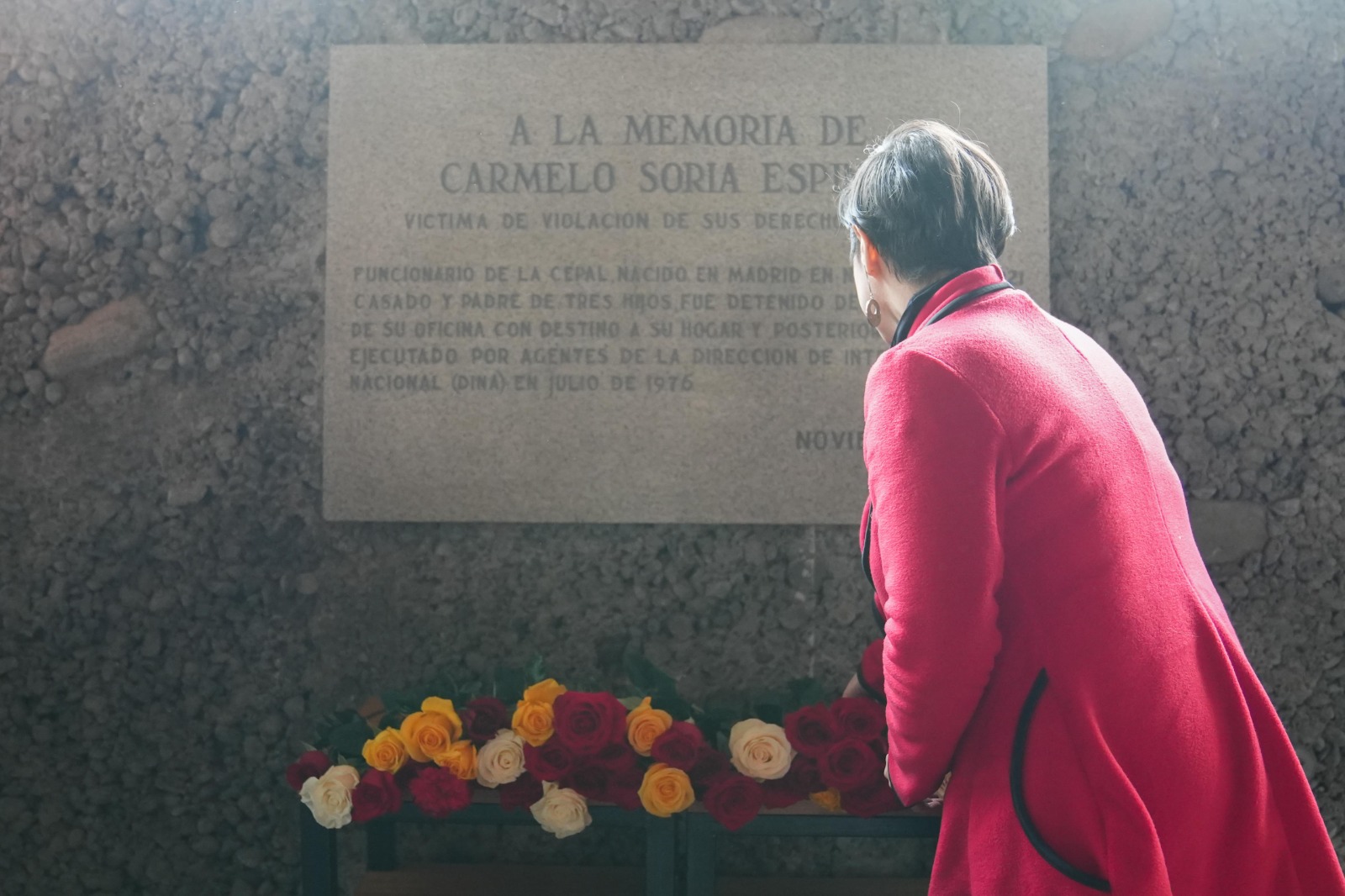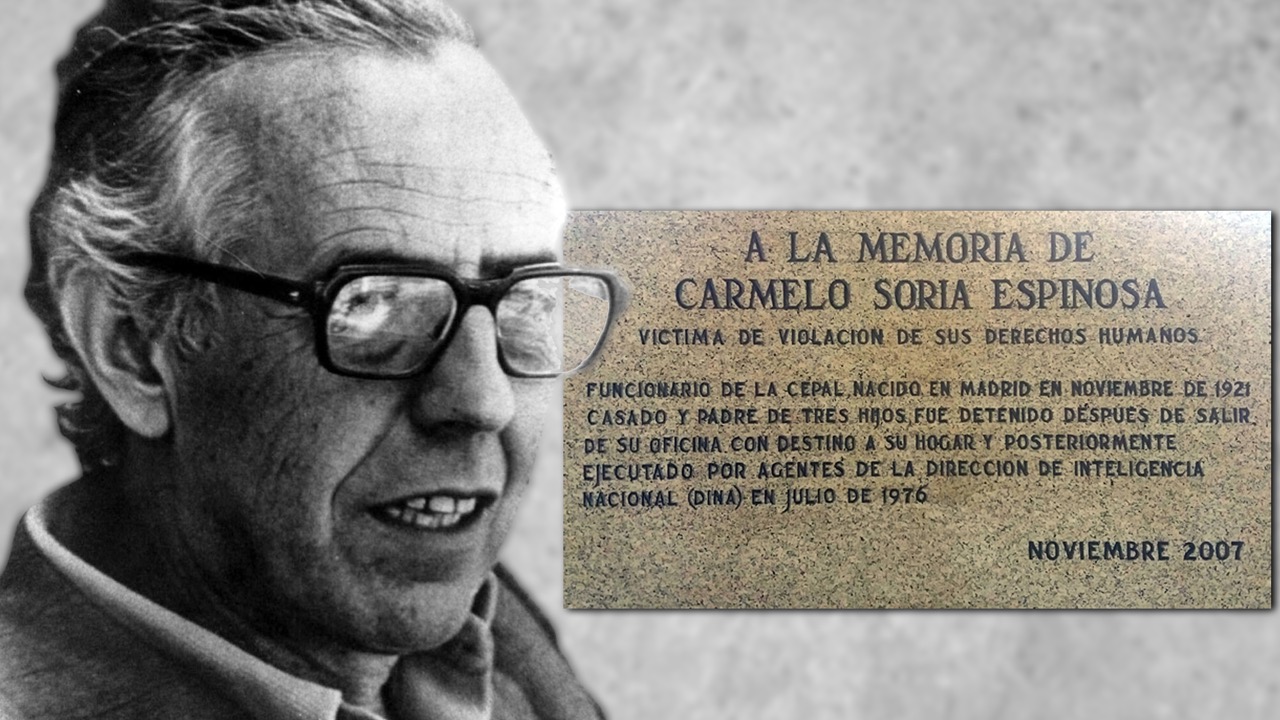ECLAC Pays Tribute to the Memory and Legacy of Carmelo Soria Espinoza, 47 Years After His Murder
The Spanish economist and diplomat, who was an official of the United Nations regional organization, was kidnapped, tortured and killed by the dictatorship’s agents in 1976.

The Executive Secretary of the Economic Commission for Latin America and the Caribbean (ECLAC), José Manuel Salazar-Xirinachs, led a ceremony today to pay tribute to the memory and legacy of Carmelo Soria Espinoza, a Spanish economist and diplomat and official of the United Nations regional organization who was kidnapped, tortured and later murdered by agents of the dictatorship in Chile on July 16, 1976.
The ceremony was held at the Soria Plaque, a memorial in remembrance of Carmelo Soria Espinosa located at ECLAC’s main headquarters in Santiago, Chile.
Participating in the ceremony along with ECLAC’s Executive Secretary were representatives of the Soria family, particularly his widow, Laura González Vera-Merchant, and his daughter, Carmen; Fernando Martínez López, Secretary of State for Democratic Memory of the Government of Spain; and Pilar Cancela, Secretary of State for International Cooperation at Spain’s Ministry of Foreign Affairs.
“We gather together to remember Carmelo Soria, to pay tribute to his memory and recognize the tireless efforts made by his family to ensure that those responsible for his murder were punished,” José Manuel Salazar-Xirinachs said upon initiating the ceremony.
He added that from the beginning, ECLAC experienced Carmelo Soria’s death as an institutional pain, “and for more than four decades it has been an open wound that today, we move forward on curing, if that is possible.”
The regional organization’s highest authority recalled that, from the United Nations Headquarters in New York, three secretary-generals led numerous efforts on this matter, refusing to accept the official version of events that attributed Carmelo Soria’s death to a traffic accident.
“At that time, the goal was to shed light on the crime, identify the perpetrators and obtain effective punishment for them from the Chilean authorities,” he said.
From Santiago, meanwhile, ECLAC’s former executive secretaries – Enrique Iglesias (1972-1985), Norberto González (1985-1987), Gert Rosenthal (1988-1997), José Antonio Ocampo (1998-2003), José Luis Machinea (2003-2008) and Alicia Bárcena (2008-2022) – each under different circumstances and at distinct points in the process, “sustained this institutional aim and made countless efforts to achieve the necessary punishment of those guilty of this horrendous crime,” José Manuel Salazar-Xirinachs affirmed.
“Today we meet at this memorial inaugurated on November 8, 2007 to attest with our presence that Carmelo Soria is still among us and his example and commitment will not be forgotten,” he emphasized.
Fernando Martínez López, Secretary of State for Democratic Memory of the Government of Spain, meanwhile, stressed that the act of paying tribute to Carmelo Soria serves three functions: “A reparational function regarding what was done; a pedagogical function, so that dramatic events such as this murder are never repeated; and a preventive function to always defend human rights.”
Pilar Cancela, Spain’s Secretary of State for International Cooperation, stated that “Carmelo Soria was one of us since we share with him the fight and conviction for freedom. The fight to defend values that are not only one’s own, but are the values that identify democracy.”
Carmen Soria thanked the Spanish Government and ECLAC for their efforts in pursuit of justice. However, she said that 47 years later, the conviction by Chile’s Supreme Court is insufficient, and she reiterated the need for all those convicted of the crime against her father to serve effective prison sentences.
On August 22 of this year, the Chilean Supreme Court handed down a final conviction for the crime against Carmelo Soria Espinoza, convicting six former agents of the National Intelligence Directorate (DINA) – which was the secret police under Augusto Pinochet’s dictatorship (1973-1990) – and two former members of the Army.
The verdict by Chile’s highest court affirms that Carmelo Soria “was deprived of his liberty by armed agents of the DINA, who took him to a hidden place, where he was kept blindfolded and tied up for hours, and subjected to interrogation under physical coercion that caused his death, making it clear that the agents engaged in two sets of illicit actions, which are completely distinct, the first of which was carried out with the aim of depriving Mr. Soria Espinoza of his liberty, while the second set was perpetrated to kill him.”
The records gathered by ECLAC in relation to the case that investigated Carmelo Soria’s murder were donated to the collection of Chile’s Museum of Memory and Human Rights, where they are freely available for consultation.
Related content

ECLAC Welcomes Chilean Supreme Court’s Final Conviction in the Murder of Carmelo Soria
The Spanish economist and diplomat, who was an official of the United Nations regional organization, was kidnapped, tortured and later killed by the dictatorship’s agents in July 1976.
Type
Country(ies)
- Latin America and the Caribbean
-
Spain